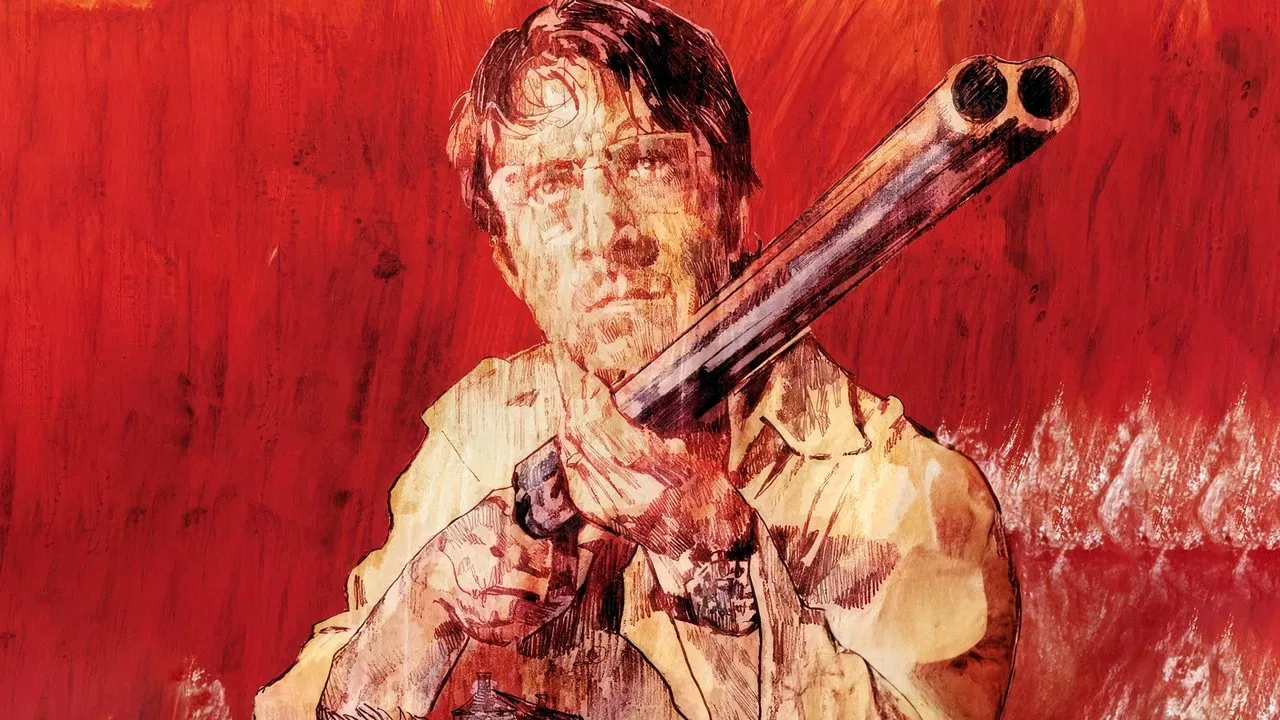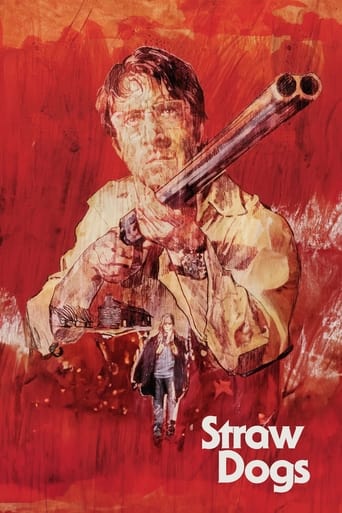

Truly Dreadful Film
... View MoreSERIOUSLY. This is what the crap Hollywood still puts out?
... View MoreIt is interesting even when nothing much happens, which is for most of its 3-hour running time. Read full review
... View MoreThe movie's not perfect, but it sticks the landing of its message. It was engaging - thrilling at times - and I personally thought it was a great time.
... View MoreStraw Dogs is a great movie that was often greatly misunderstood and controversial in its day. This is Sam Peckinpah's first non western, though it does have many similarities to the genre and in some ways is similar in its approach. Straw Dogs is best described as a cross between A Clockwork Orange and Deliverance, which were all released during the same period., This is a very complex, layered and psychological film about violence that lies dormant, but can be brought out in all of us. A small rural town in England is the backdrop and is centered on the dysfunctional relationship between married couple Dustin Hoffman and Susan George. The film gets a lot of flack for being misogynist, which I suppose some people have interpreted that way. This film is not a popcorn movie, the viewer is not supposed to feel good about the violence in the film and the behavior of the characters in this film. Straw Dogs is a very dark cinematic journey and misanthropy at its finest. Performances are excellent and Dustin Hoffman gives a brilliant performance, Susan George is equally excellent and gives a very brave performance also. Straw Dogs is definetely for people who like their movies to go down like hard liquor. While the film is harsh and uncompromising, it is rich in subtext and a brilliant and powerful film that is well done and challenging. If you can't handle that, then you are better off sticking to movies like Mrs. Doubtfire.
... View MoreMeek American mathematician David Sumner (a fine and credible performance by Dustin Hoffman) and his restless young wife Amy (a very brave and strong portrayal by Susan George) settle in a remote rural England village for some peace and quiet. However, their tranquility gets disrupted by a gang of local toughs.Director Sam Peckinpah ably crafts an extremely tense and uncomfortable atmosphere as well as deftly generates plenty of nerve-wracking suspense, grounds the gripping premise in a plausibly drab workaday reality, and stages the startling climax with his trademark sinewy brio. The taut and unflinching script by Peckinpah and David Zelag Goodman makes a supremely unsettling statement that one can't escape from either brutality or confrontation no matter how hard one tries to; alas, mankind's capacity for cruelty is a tragically pervasive and ubiquitous thing that infects us all to some degree or another. Of course, this film further hammers home the central bitter point that even the most passive and mild-mannered person can commit acts of savage violence if pushed far enough over the edge.Hoffman and George both do sterling work in the lead roles; they receive sturdy support from Peter Vaughan as gruff patriarch Tom Hedden, T.P. McKenna as no-nonsense lawman Major John Scott, Del Henney as Amy's still smitten former boyfriend Charlie Venner, Jim Norton as the crude Chris Cawsey, Ken Hutchison as the equally boorish Norman Scutt, Sally Thomsett as teasing young tart Janice, and David Warner as child-like, but still dangerous simpleton Henry Niles. Both John Coquillon's crisp cinematography and Jerry Fielding's spare melodic score are up to speed. By no means a pleasant movie, but nonetheless a highly potent and disturbing one.
... View MoreI saw this movie when I was in my teens and decided to watch it again after I heard there has been a remake (which I have chosen not to see--I have always been suspicious of remakes. Ha ha).This movie is basically a social comment on the lower-middle class of Britain (or shall I say of England, since the movie is set in Cornwall, England), how vulgar, primitive, and uncouth the values and mores of average lower middle class there had been in the late 1960' and early 70's, under the veneer of apparent civility. The townspeople including the reverend, taunt the protagonist (played by Hoffman)who is an American, with remarks on the racial tension or the nuclear bombs of the U.S. (insinuating 'moral hazard' and the threat the U.S. posed to the humankind, with the implication that they the British people were morally superior relative to the Americans.) Well, actually the Britishers turn out to be not so morally superior as the plot develops--they murder, rape, steal, cheat and harass people from outside. (The movie had been banned in Britain until 2002. I suspect the supposedly 'controversial' rape scene was not the real agenda for the ban.)Britain has been and is basically a class society, probably even more so than the pre-1917 revolution Russsia. The lower class live vulgar and the 'upper class' live pretending to be not so vulgar--however they are all the same--as Sam Peckinpah portrays the 'reverend.' The English are dangerous people to trust--They are treacherous, under veneer of civility. If you are stranded in a lifeboat with them. They will kill and eat you. Do not trust them just because they sing opera aria.
... View MoreI never saw a film so simple and yet so complex at the same time. This is how sophisticated Sam Peckinpah was as director of Straw Dogs. He must have had a god-like understanding of human beings and their vulnerabilities, or Straw Dogs would have turned out a forgettable made-for-TV movie. On the contrary, the film is increasingly relevant to mankind as time goes by, surpassing even a classic branding. The story plot and the script are exceptionally well-done, as it rids the viewers of any disbelief from early on. You stop asking why they move there, why Amy Sumner chooses to conduct herself that way, why there is tension between her and the husband. Why the rape is emotionally mixed between yearning and disgust on her part, and all the rest. You subscribe to the film from the beginning, and helplessly follow them every step of the way until every bit of emotion is brutally unfolded and till tail lights of that white car disappears into the darkness. If you show this 1971 film around the US today, it would be easily alleged of campaigning for the National Rifles Association to support the rights to bear arms. It is scary to discover that violence does not have to start from your own inclination or their provocation. Violence can be a result of mutual contempt without you being conscious of helping to develop one. In this film, violence is much a combination of David, Amy, Charlie, Chris, Norman, Henry, Tom, Reverend Barney Hood, to even the lawman Major John Scott, who represents a mindset of "the law is dead". Sam Peckinpah, as this film was first released, was condemned almost unanimously by critics and viewers alike. He was accused of glorifying violence, in support of a lawless society, and in favor of Doomsday's analogies. Today we see him as a prophet who was and is wise. His analysis of social problems is second to none. You can even restructure all governments' crime-preventing policy based upon his films, particularly on this one. Someone made the right call not to try any sequels of this film. The reason is obvious: we now become the real-life sequel of David Sumner's driving Henry Niles into the dark on that fateful night.
... View More